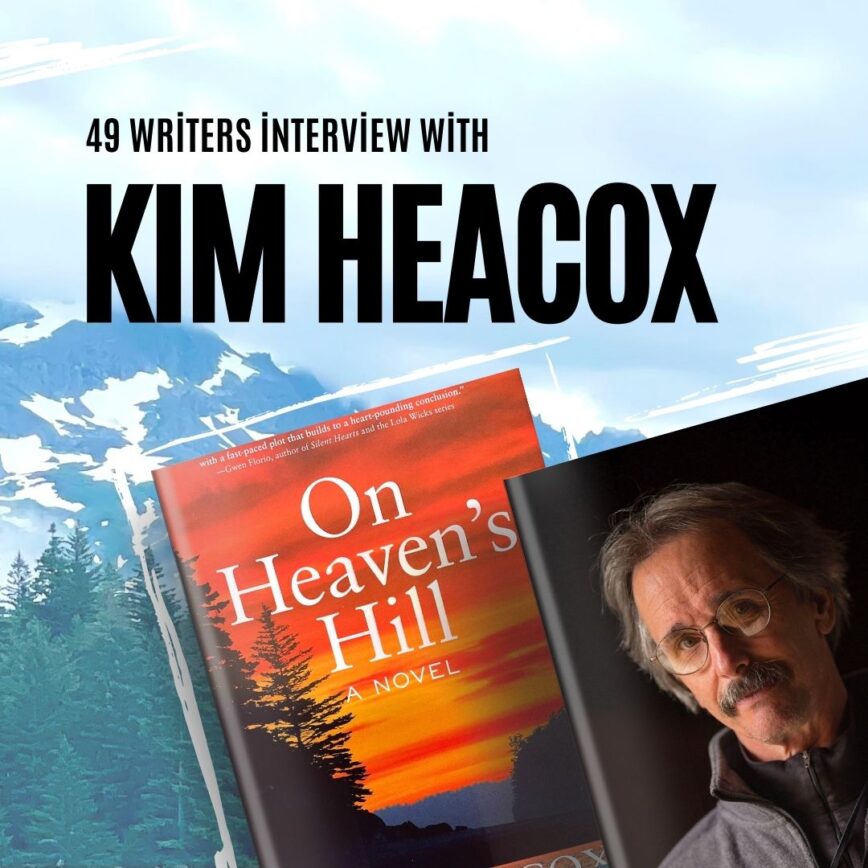Author Kim Heacox’s 2023 novel, On Heaven’s Hill (OHH), has been described by novelist Kimi Eisele as “…the kind of story the planet needs right now.” It depicts a small town in coastal Alaska where a group of war veterans form an unlikely alliance with feisty schoolchildren to help defend a pack of wolves. It doesn’t shy away from climate change or biodiversity collapse, two issues that could turn our world upside down if left unaddressed. As such, On Heaven’s Hill is somewhat controversial, and has earned Heacox both criticism and praise. This summer it was named a three-time finalist for the American Fiction Awards: in general, literary and military fiction.
49W: What was your process for writing OHH? Did you outline? Did you know what you wanted to say from the start?
KH: Yes. I knew I wanted to write about human-caused threats to our livable world, specifically the climate crisis and global biodiversity collapse. Rather than write a historical novel or, say, a mystery, suspense or science-fiction story set in a different time and place, I decided to build a character-driven story focused on contemporary issues, propelled by colorful war veterans and feisty schoolchildren. From there, I created a rough outline, and set it in Southeast Alaska, where I live. It took me three years to write the first draft (I’m slow), probably writing two to four hours per day for five to six days per week. It then took another three years of revising the manuscript over and over, using valuable feedback from friends who served as critical readers.
49W: What was the biggest change you made to the manuscript and why?
KH: I moved the entire story from past tense into present tense, to make it more immediate.
49W: What challenges did you have to overcome or new skills did you have to develop in order to tell this story?
KH: I had to do a lot of research to put the readers into the hearts and minds of war veterans, schoolchildren and wolves. For example: How do veterans talk to each other? How does PTSD (post-traumatic stress disorder) affect their lives? How do wolves hunt and travel as a pack? How do schoolchildren make friends, form cliques and regard their teachers? How do they learn? What do they consider cool and not cool? All of that and more. Much more.
49W: Since 2017, you’ve written high-profile opinion pieces for The Guardian on the climate crisis, global biodiversity loss and threats to US public lands. Is that about the time you began writing OHH? And has your work for The Guardian affected the way you approach fiction?
KH: Yes and yes. I feel that it’s my moral duty as a free writer to address the destruction of our livable planet. Harriet Beecher Stowe felt the same way when she decided to write about the brutalities and great injustices of slavery, to depict it in a way no other author had. It was daring and courageous, and it changed everything, and I greatly admire her.
49W: Which do you think is more effective – fiction or nonfiction – in #1) attracting readers, #2) getting them to see things as they haven’t before, and #3) inspiring them to do something… to perhaps become activists themselves, like young Kes, your pre-teen wolf advocate in OHH?
KH: For #1: attracting young readers, I’d say fiction. Nothing’s more powerful than a good story. Look at the Harry Potter phenomenon. Same with #2. Fiction is almost magical in getting readers to walk in the shoes of others; to building empathy and compassion. As for #3, I’d say both fiction and nonfiction. A good nonfiction book can lay it all out. For example: The Green Boat by Mary Pipher, the grandmother activist and bestselling author who stood up to the Keystone Pipeline. Add to that anything written by Bill McKibben, especially his first book, The End of Nature, that introduced vast numbers of readers to the climate crisis. And let’s not forget The Sixth Extinction by Elizabeth Kolbert, which paints a sobering picture of global biodiversity collapse. These authors are heroes in my book.
49W: How do you write a story about human-caused climate change – perhaps the greatest existential crisis to ever threaten not just our own survival but that of much of life on earth – without depressing readers?
KH: Use humor. Be playful. Create likeable, sympathetic characters. Tell a good story.
49W: Do you have any revelations or wisdom you plan to bring with you to your next project?
KH: I’ve started another novel, one that, if I can pull it off, will be the third in an Alaska trilogy, the first two being Jimmy Bluefeather (2015) and On Heaven’s Hill (2023), which reprises four characters from Jimmy. As for wisdom, I recently wrote a line in my next novel that goes like this: “It all comes down to fear, my friend. Fear of the other and fear of the unknown. Vanquish those fears and you’ll find yourself on the road to open-mindedness and open-heartedness… the road to wisdom.
49W: This was wonderful. Thank you so much for your time, Kim!
A former ranger with US National Park Service, Kim Heacox has been a freelance writer/author for more than 40 years. His books have received starred reviews in Kirkus, Publishers Weekly and Booklist, and been featured on many podcasts, and on National Public Radio’s “Living on Earth.” While he often garnishes his fiction with humor, Kim is an unabashed activist author who writes to illuminate more than to entertain. In short, he doesn’t write to say something; he writes because he has something to say. You can find more information at kimheacox.com.

